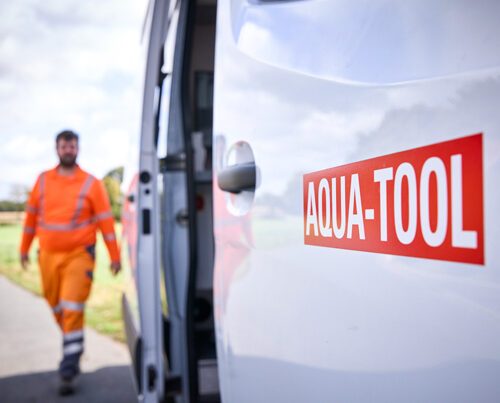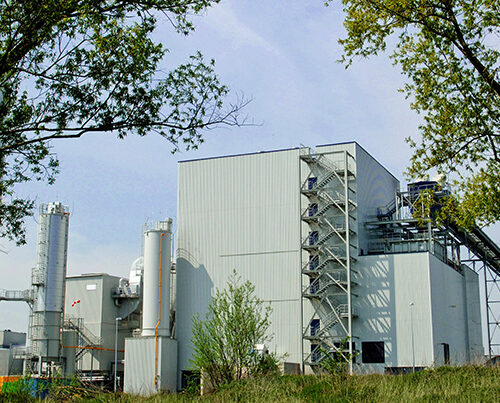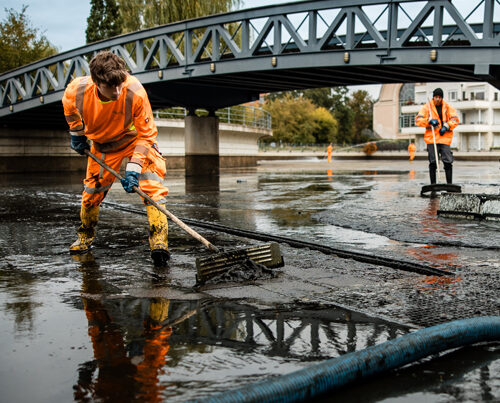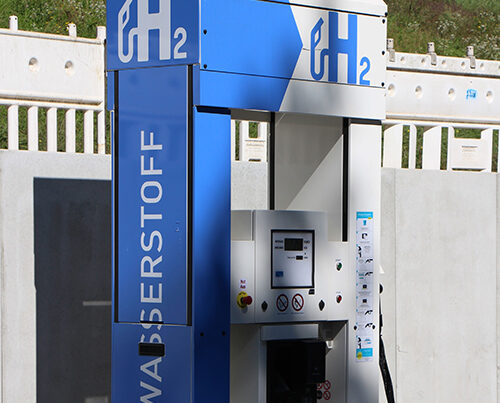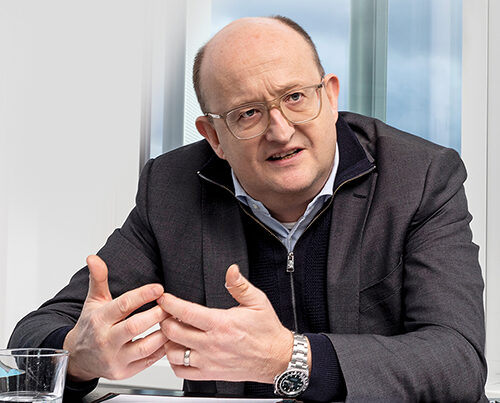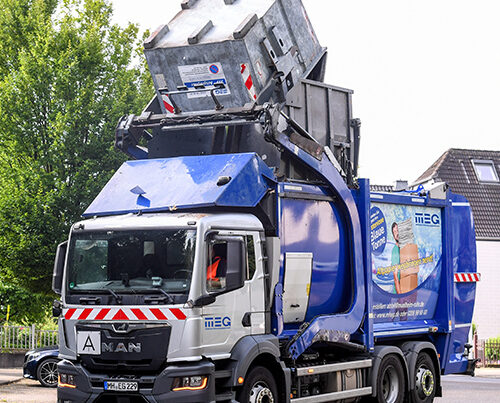Germany’s largest fleet of battery-electric waste collection vehicles is now on the road in Frankfurt. FES Frankfurter Entsorgungs- und Service GmbH has received the first six (of the eight ordered) fully electric waste collection vehicles from the manufacturer Daimler Truck. At the same time, the company’s subsidiary FFR is putting four e-tractor units from Volvo into service. Both acquisitions have an immediate positive effect on Frankfurt’s CO2 balance thanks to local zero emissions.
The new e-trucks were publicly presented at the Festplatz Frankfurt. Manufacturers informed their future users, sponsors and guests about the new drive technology directly at the vehicle. Unlike in the passenger car sector, battery propulsion is technically uncharted territory in the heavy-duty sector, especially for complex commercial collection vehicles. The waste collection vehicles (of the type eEconic) are also the first series models to be delivered in Germany.
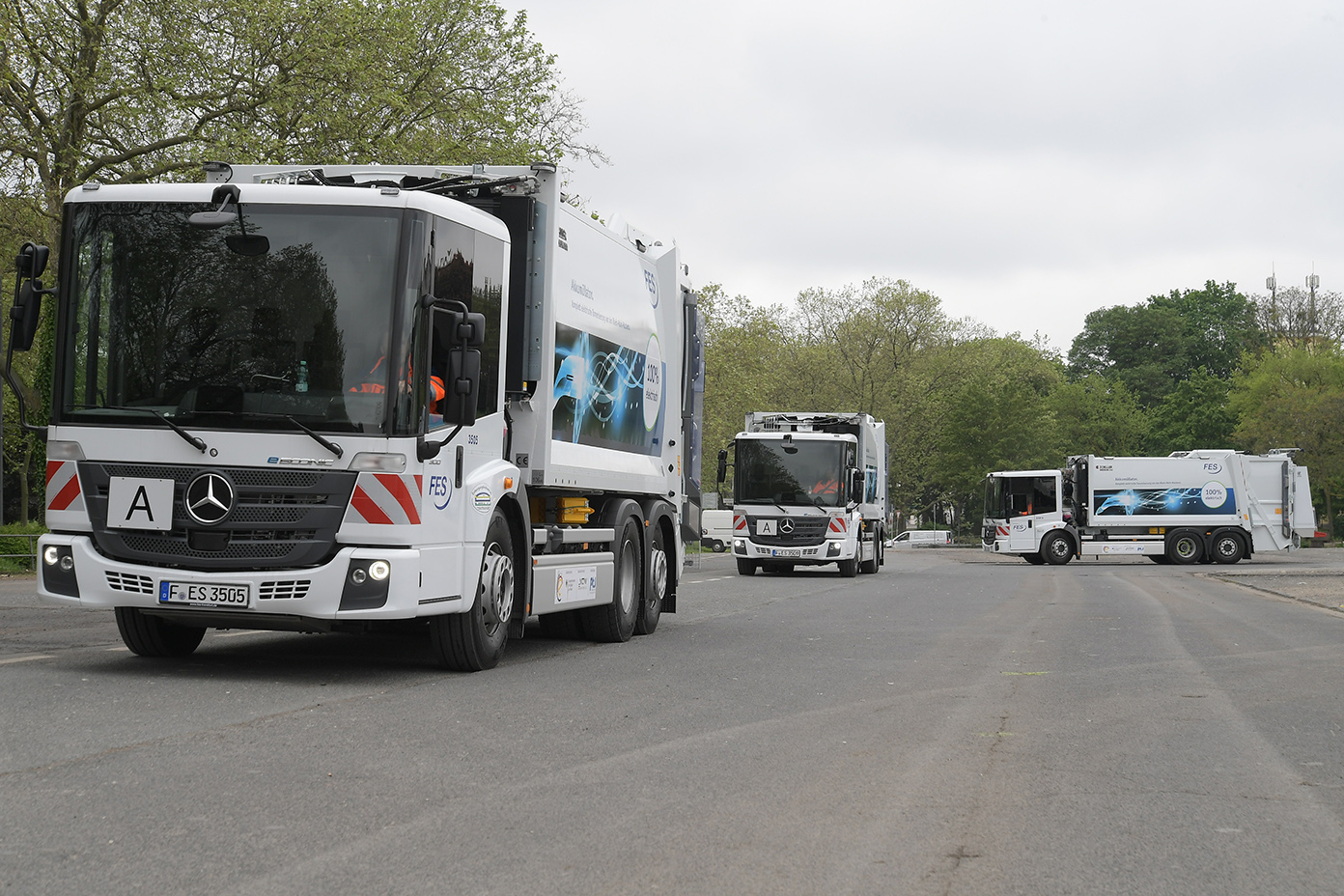
FES and FFR presented the new fleet at the Festplatz Frankfurt
Public sector funding
The new purchases are co-financed by the Federal Ministry for Digital and Transport (BMDV): 2.55 million euros for the eight waste collection vehicles and just under one million for the articulated lorries mean public funding of 90 and 80 per cent of the additional costs respectively compared to a conventional diesel-powered vehicle.
The funding comes from the BMDV’s Electromobility Funding Guideline, which is being implemented by Project Management Jülich (PtJ). The semi-trailer trucks are supported by the BMDV’s Directive on the Promotion of Light and Heavy Commercial Vehicles with Alternative, Climate-friendly Drive Systems and Associated Fuelling and Charging Infrastructure (KsNI). Here, the Federal Logistics and Mobility Office approves the applications. NOW GmbH coordinates both funding guidelines.
Daniela Kluckert, Parliamentary State Secretary at the Federal Ministry of Digital and Transport, spoke of an important contribution to climate-friendly and innovative mobility. “I am pleased about the successful use of our funding. The new collection vehicles and articulated lorries will be visible on the road in daily use and demonstrate that electric mobility also works on a large scale and with heavy commercial vehicles.”
Contribution to transport turnaround and climate protection
On behalf of the City of Frankfurt am Main, which is also the majority shareholder of FES, head of transport Stefan Majer emphasised the important contribution to the transport turnaround and climate protection. “The perseverance of the city’s politicians and those responsible at FES has paid off. Today, the city of Frankfurt has become the centre of emission-free waste collection in one fell swoop. This helps us enormously on our way to climate neutrality by 2035, and I am delighted.”
Emissions from the FES fleet are reduced by 166 tonnes of CO2 per year (eight vehicles: 221 tonnes) through the use of the eEconics alone. The mileage of the four articulated lorries is greater, here the replacement of fossil drive technology brings a further 300 tonnes of CO2 savings per year.
REMONDIS tests various alternative fuels
Sascha Hähnke, managing director of REMONDIS, emphasised the good cooperation with the City of Frankfurt on the issue of alternative drive technology. The recycling company is a private shareholder of FES. “Our company in Frankfurt is a model for many of our municipal investments where we are currently testing different technologies in practice. The experience we have gained here also provides us with valuable knowledge for REMONDIS as a whole. The decarbonisation of vehicle fleets is becoming an increasingly important topic for us.“
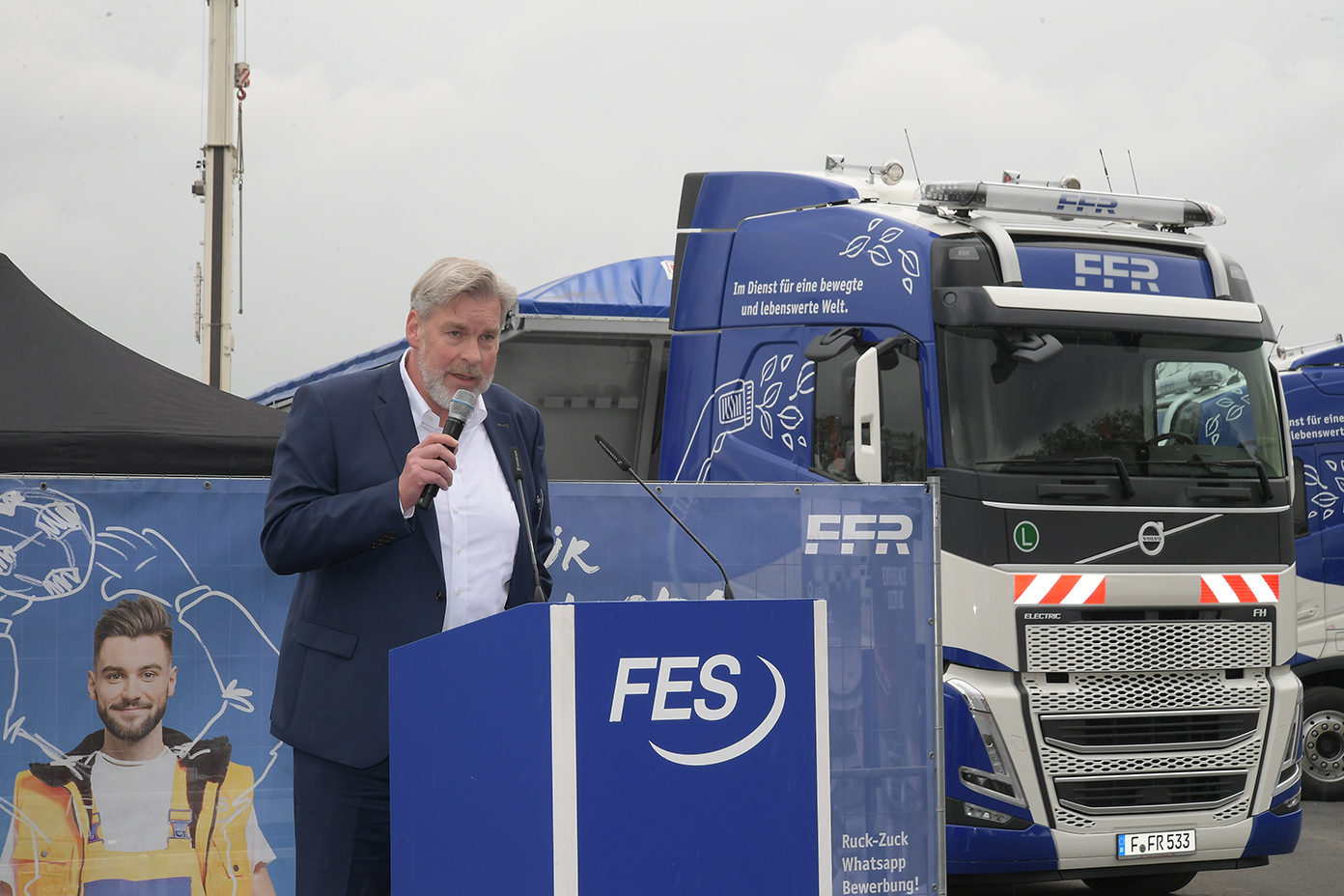
Sascha Hähnke spoke about decarbonising the fleet at REMONDIS
New vehicles for FES and FFR
To build up the new fleet, FES had already developed an innovative charging concept in recent years, which FES managing director Dirk Remmert particularly pointed out: “Our e-collection vehicles will charge the locally generated electricity at the waste-to-energy plant in Heddernheim. This means: waste that has to be incinerated anyway for hygienic reasons or is no longer suitable for recycling now helps us to reduce the emissions of our vehicles locally to zero. A win-win situation for us, the city and the citizens.”
The same charging infrastructure is also used by FFR GmbH for its e-tractor units. On the one hand, these are used to transport slag waste from waste incineration from the waste-to-energy plant to Wicker, and on the other hand, they are used to transport commercial waste, mainly in the urban area. Similar to the collection vehicles, they have predefined route lengths and always return to their depot after a round trip.
Managing director Rolf Niermann: “E-mobility is the right path for us. Many customers are currently looking at their carbon footprint, checking their supply chains and demanding transparency from their service providers. I am convinced that zero-emission waste collection, cleaning, event services or green maintenance will soon be included as a criterion in tenders. We can then continue to offer and deliver.”
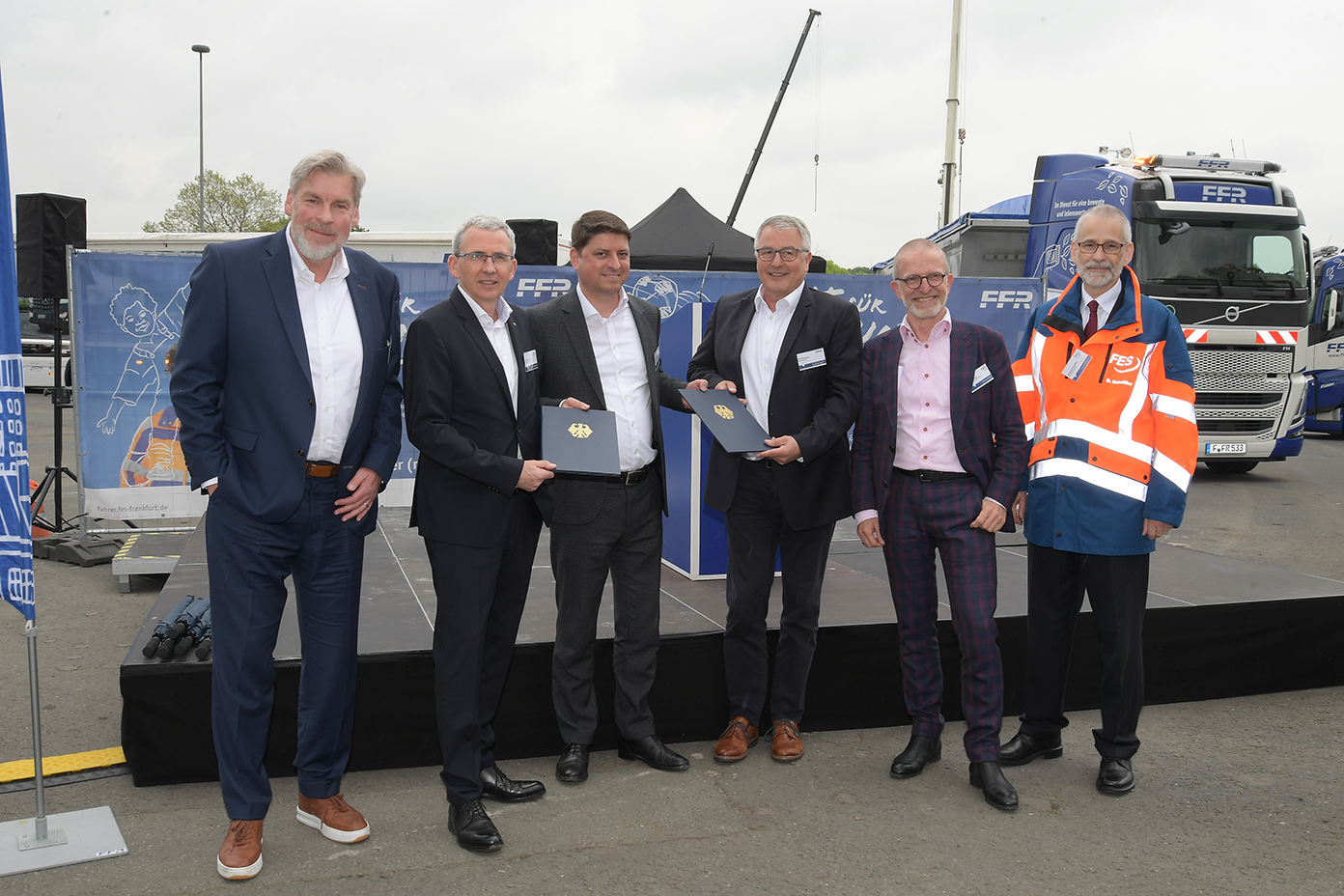
From left: Sascha Hähnke (Managing Director REMONDIS), Dirk Remmert (Managing Director FES), Nikolaus Oberkandler (Head of Department for Electric Mobility and Charging Infrastructure at the Federal Ministry of Digital and Transport), Rolf Niermann (Managing Director FFR), StR Stefan Majer (Head of Transport for the City of Frankfurt) and Benjamin Scheffler (Managing Director FES)
Summary
- The waste collection vehicles are primarily used in the core city area, i.e. inner city, old town, Sachsenhausen, Westend and Nordend.
- The Heddernheim site is home to both the waste-to-energy plant Frankfurt, which is operated by FES and Mainova, and the waste collection vehicle fleet
- The charging infrastructure currently offers ten independent DC fast charging points with a charging capacity of 150 kilowatts. The manufacturer is ABB; the type designation of the charging points is: HVC 150
- FES calculates the charging cycle of an eEconics vehicle at three hours. In addition to waste collection vehicles, e-buses for public transport have also been charging in Frankfurt Heddernheim since the end of 2020
Bildnachweise: © FES







